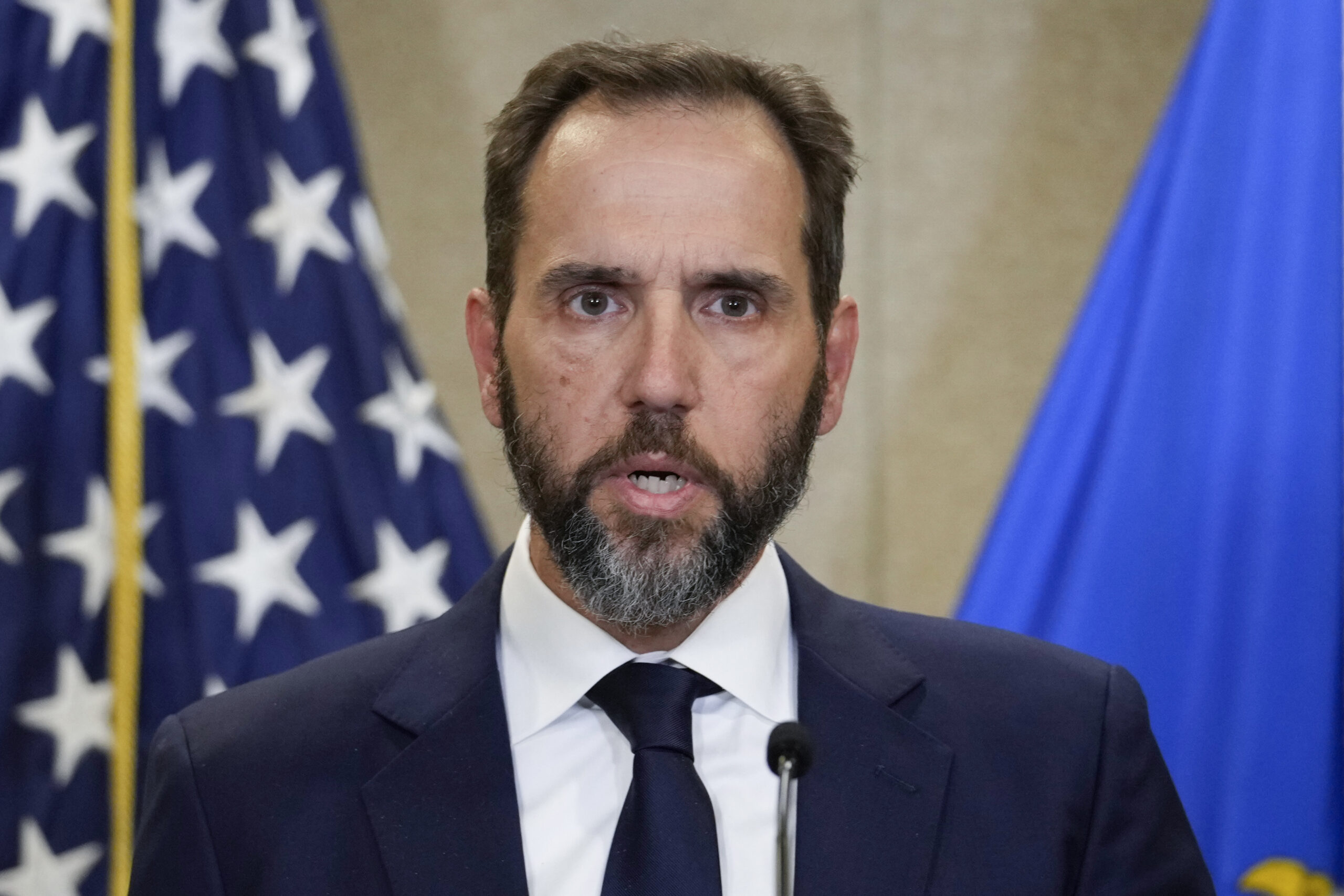

Special counsel Jack Smith rejected former President Donald Trump‘s claims that the classified documents case against him in Florida should be dismissed, according to court documents filed Thursday.
Smith addressed several arguments Trump had made in his requests for dismissal, including the former president’s claim that he was authorized under the Presidential Records Act to declassify documents and that his actions were protected by presidential immunity.
Trump has asserted on several occasions that he was “covered by the Presidential Records Act” after Smith charged him last year with willfully retaining national defense information at his Mar-a-Lago residence following his exit from the White House.
Trump’s attorneys moved to dismiss the case on those grounds, saying in a filing last month that the Presidential Records Act granted “unreviewable discretion on President Trump to designate the records at issue as personal.”
Government prosecutors countered on Thursday, arguing that “Trump’s reliance on the PRA as a basis for dismissing the indictment is wrong.”
“The PRA does not exempt Trump from the criminal law, entitle him to unilaterally declare highly classified presidential records to be personal records, or shield him from criminal investigations—let alone allow him to obstruct a federal investigation with impunity,” the prosecutors wrote in a 29-page filing.
They said Trump’s argument is flawed because the 1970s-era records statute was not applicable to the charges the special counsel leveled against Trump, which largely fall under the Espionage Act.
“Even if the raft of highly classified documents that Trump took from the White House to Mar-a-Lago were somehow categorized as ‘personal’ under the PRA, that would not render his retention of those documents ‘authorized’ for purposes of Section 793(e)” the prosecutors wrote.
Prosecutors filed dozens of additional pages in separate responses seeking to trounce Trump’s multitude of motions seeking to dismiss the indictment.
Smith argues his appointment and funding is appropriate
Trump’s attorneys have also claimed that Attorney General Merrick Garland‘s appointment of Smith to handle the criminal indictment is not proper. Defense attorneys had argued in part that Smith “lacks the legal authority to prosecute this case and the lawful funding to carry out any prosecution.”
“The Supreme Court recognized in closely analogous circumstances nearly 50 years ago, in United States v. Nixon, that the Attorney General has the statutory authority to appoint a Special Prosecutor,” prosecutors wrote in a separate 29-page filing.
The special counsel’s office also disputed claims of improper funding for Smith’s role, saying “the lawfulness of this practice is confirmed by statutory text, history, and longstanding practice (including funding for a special counsel appointed during Trump’s administration).”
Trump is not “similarly situated” as others accused of mishandling records, Smith claims
The special counsel also made an audacious move to file a response against Trump’s “selective prosecution” claim by outlining nine other political figures who have been accused of mishandling classified information. Citing names ranging from President Joe Biden to former FBI Director James Comey, Smith argued that none of those similarly-accused figures attempted to obstruct an investigation in the way Trump is accused of doing.
“Among other things, the scheme included an effort to enlist his own attorney in the corrupt endeavor, suggesting that the attorney falsely tell the FBI and grand jury that Trump did not have any documents, and suggesting that his attorney hide or destroy documents rather than produce them to the government,” prosecutors wrote in a 29-page filing.
Moreover, a separate filing from prosecutors focused on Trump’s two co-defendants, Walt Nauta and Carlos De Oliveira, and their efforts to dismiss the case. Prosecutors said Nauta brought boxes of documents to Trump for him to review but claimed the former president ended that review after only looking at 15 books and ordered those to be shipped to the National Archives, even though there are around 70 more boxes still in storage.
Presidential immunity argument is all about trial ‘delay:’ Prosecutors
Not only is Smith preparing to argue that Trump is not immune from criminal prosecution in a Supreme Court case surrounding the separate four-count indictment against Trump in Washington, D.C., but he is also fighting Trump’s similar claims in the documents case.
“That frivolous claim is offered for one transparent purpose—to delay the trial—and it fails for two independent reasons,” prosecutors wrote in a 27-page filing.
In summary, they argued Trump’s immunity claim fails because the superseding indictment that came weeks after Trump’s initial indictment in the summer of 2023 “does not charge Trump for any acts that he undertook as President.”
“Trump’s immunity claim here is so wholly without merit that it is difficult to understand it except as part of a strategic effort for delay,” they wrote, adding that “a groundless appeal should not be permitted to have that effect” of delay.
Trump has successfully delayed his 2020 election subversion trial in Washington, D.C., by convincing the Supreme Court to weigh the merits of that argument on April 25 because the trial court judge in that case will not have jurisdiction to move forward with pretrial activities until the case is returned to her. That process could take weeks or months.
Smith chides Trump over ‘vagueness’ argument
Attorneys for the former president have also said the case against him should be dismissed because of instances of “vagueness” that they say surrounds the laws Trump is accused of violating.
CLICK HERE TO READ MORE FROM THE WASHINGTON EXAMINER
“Not only do Section 793(e)’s text and judicial interpretations provide fair notice, but Trump’s fair-notice claim is particularly weak and implausible because Trump was personally on notice concerning the importance of proper handling of classified national defense information. He acknowledged as much both before and during his presidency,” prosecutors wrote in a 29-page filing.
Judge Aileen Cannon, a Trump appointee who is overseeing the case, has the final say over whether to grant any of Trump’s dismissals. Trump has until March 13 to file counterarguments to Smith, and Cannon’s decisions would come in the days or weeks after that.




